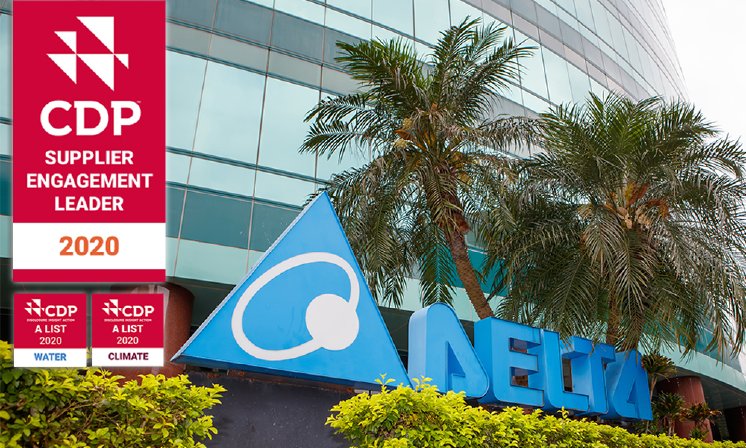Mr. Jesse Chou, Delta’s chief sustainability officer, said: “Delta has long been concerned about climate change and actively participates in international initiatives. In 2015, it signed We Mean Business, and passed and implemented Science Based Targets (SBTs) in 2017 and achieved its annual SBTs for three consecutive years. Meanwhile, it actively introduced Task Force on Climate-related Financial Disclosures (TCFD) to assess the risks and opportunities brought about by climate change. For global suppliers, Delta has also established key short- and medium-term targets for its supply chain, strengthened supplier operation management and risk identification, and assisted with in-depth analyses of the supply chain disruption risk caused by climate change, while sharing its experience in water conservation at its plants and green buildings so as to plan for mitigating and adapting to the impact of climate change and to realize the vision of a sustainable value chain. It is an honor for Delta to receive the leadership level A rating in the CDP assessment in conjunction with its business partners and global suppliers.”
Delta regards suppliers as long-term partners and is committed to enhancing the management of environmental, social, governance (ESG) aspects of the green supply chain and implementing the Supplier Sustainability Management Regulations. In addition, it conducts relevant ESG questionnaire surveys for different types of suppliers each year to cover the operation of the entire supply chain system and be more informed of different types of suppliers, to increase the completion rate of risk identification significantly, while reducing the risk of supplier chain disruption effectively through audits, corrections, counseling, and training. Furthermore, Delta has continued to enhance operational management and risk identification, and conducted in-depth analyses of the supplier chain disruption risk caused by drought risks under climate change. From the top 80% of the key suppliers in terms of the annual purchase amount, nearly 90 key suppliers were selected for a drought risk assessment, and the risk assessment results were included in the basis for Delta’s decision-making. Moreover, for suppliers whose production sites are located in water-scarce areas, Delta shares its experience in water conservation at its plants and green buildings, assists them in formulating climate change mitigation and adaptation plans and correction plans, and helps them seek external counseling resources and analyze water consumption, to foster the sustainable value chain.
SER is an annual rating of the performance of supply chain management based on the CDP's supply chain plan questionnaire to which companies respond. In addition to the key item of "supplier engagement," the rating covers the items of "governance," "targets," "scope 3 emissions," and "overall CDP climate change performance." Delta passed the SBTs in 2017 and is committed to reducing carbon intensity by 56.6% in 2025 compared to 2014, while achieving SBTs for three consecutive years from 2018 to 2020. All scope 1 and scope 2 greenhouse gases in the entire plant area passed the ISO 14064-1 certification, and the scope 3 emissions also passed the third-party certification. In 2019, ISAE 3000 assurance engagement was conducted to provide assurance for Delta's 11 energy-saving products, including server power supplies, solar inverters, uninterruptible power systems, and electric vehicle DC chargers, to help clients reduce carbon emissions. Various climate actions have not only enabled Delta to be rated "A" in "supplier engagement," "scope 3 emissions," and "overall CDP climate change performance" in CDP's SER but to demonstrate its determination to work with suppliers and clients to move towards the zero carbon and sustainability goals, thereby echoing CDP SER's goal of achieving value chain carbon reduction through engagement.
The non-profit organization CDP's annual environmental information disclosure and scoring process are recognized as an important standard for corporate environmental information transparency. In 2020, more than 515 investors around the world with assets of more than US$106 trillion were CDP signatories, who were required to disclose information on environmental impacts, risks, and opportunities through the CDP platform. This year, more than 9,600 companies has responded to the CDP evaluation, reaching a record high in history.
Note 1: "Supplier engagement" means that companies take specific actions to communicate and discuss sustainability-related issues with suppliers in the management of climate change to reduce possible risks in the future. (Source: https://csrone.com/... by Dr. Yao-Te Chen)
Note 2: Three categories of greenhouse gas emissions (Scope 1–3):
- Scope 1: Direct emissions from the sources owned or controlled by an organization (such as diesel, gasoline, or natural gas)
- Scope 2: Indirect emissions from an organization’s purchased electricity
- Scope 3: Other indirect emissions, including the carbon emissions generated from the upstream and downstream organizational activities in a company's value chain.


